FESTIVALPROGRAMM BLOG
AUSZÜGE IN DEUTSCHSIMPLICITY - the art of complexity - ARS ELECTRONICA 2006 - Festival für Kunst, Technologie und Gesellschaft - Linz, Do 31. August – Di 5. September
15
Jul
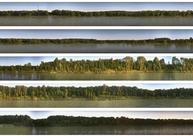 © Michael Aschauer
© Michael Aschauer
The Danube Panorama Project is an experimental approach to photographic mapping and cartography. It's goal is to produce a full panorama of the Danube's river sides by digitally slit-scanning its coastlines, resulting in a unique 'cross section' of contemporary Europe.
The Danube - "Europe's River of Destiny" - connecting Western, Central and Eastern Europe uniquely reflects the shifting relationships of its peoples, cultures and religions in its accumulated history and contemporary dimensions. It is as much a cultural as a geographic landscape. It will guide as a symbolic red line of this intense survey.
Michael Aschauer (AT)
15
Jul
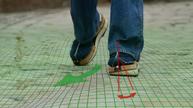 © Martin Frey
© Martin Frey
CabBoots is an innovative interface with a pedestrian navigation system. The information transmission process can be perceived tactilely, is intuitively understandable, and is applied to the part of the body most directly involved in the act of walking: the foot. Whereas conventional navigational devices normally communicate with the user on the auditory and visual levels, CabBoots utilizes the faculty of kinesthetic perception akin to walking on a well-trodden path.
Martin Frey (DE)
14
Jul
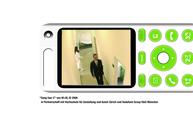 © Martin de Mattia/ Marc Weis
© Martin de Mattia/ Marc Weis
With their "Song for C", artistic duo M+M (Marc Weis and Martin De Mattia) has come up with a "film noir"-style detective story in which the boundary between fiction and real life tends to get a bit blurred.
The narrative gets the audience of cell phone users partaking of it involved in a drama entailing a variety of different seemingly authentic messages, transmitted images, clues and leads that turn passive viewers into active “voyeurs” of what is transpiring. It works like this: a female detective sends out mobile video dispatches to keep the audience of cell phone users updated about the progress of her investigation and, at the same time, to actively involve them in the case.
"Song for C"– a cinematic narrative for cell phones by M+M
Project Associates: Department of Technology of the HGKZ – School of Art and Design Zurich; Mobile Art Lab of Vodafone Group R&D, Germany
Martin de Mattia
Marc Weis
14
Jul
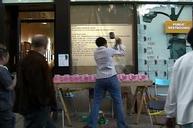 © Taylor Hokanson
© Taylor Hokanson
The Sledgehammer Keyboard communicates with a computer like its common counterpart - it is the user's experience that is unusual. Participants are invited to lay down their thoughts by striking its keys with a hammer. Each key requires a great force to activate, so users must be aggressive and concise in order to complete an idea.
The printing press, ballpoint pen and desktop computer all represent great leaps in the technology of communication. Each of these benchmarks made the writing process easier, at least in terms of procedure. But perhaps something is lost when an intellectual endeavor becomes too facile. If we put less physical effort into writing, is there also a corresponding shift in mental effort?
Taylor Hokanson (US)
13
Jul
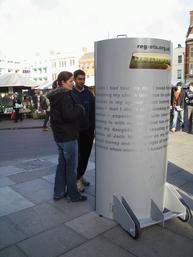 © Graham Budgett/ Jane Mulfinger
© Graham Budgett/ Jane Mulfinger
Regrets are often the conceptual vehicle of self-improving tendencies, but they are rarely communally active in any meaningful way. The Regrets team seeks to intervene and enable such interaction. In particular, remorse is posited here as a positive entity, incorporating recall, reflection, and learning.
Five custom mobile computer units roaming public space in and around a chosen city, community, or event, collect anonymously submitted regrets from the public, gathering and comparing them to comprise a sociological database of contemporary regret. Instant feedback to the individual user based on other contributors' similar concerns is algorithmically generated to 'share the burden'. Random selections of the regrets are made public via locally negotiated sites and existing signage, network, and broadcast facilities. The archive represents a glimpse of a given community at a particular time through the rubric of regret; its results available for future studies.
Graham Budgett (US)
Jane Mulfinger (US)
13
Jul
 © Jenny Chowdhury/ Ran Tao
© Jenny Chowdhury/ Ran Tao
Mobile Assassins is an updated/mobile version of the traditional big game Assassins where each player is assigned a target and, in turn, also assigned as a target. The game Assassins has been around for years, often played in college with squirt guns as the weapon of choice.
According to Wikipedia: "Assassins is...a game were...each player has a "target"...that they are trying to kill, and each player is in turn the target of another assassin...Players are assigned their targets by the game's coordinators, but do not know the identity of the person assigned to target them. "
We've brought this traditional game into the mobile age by repurposing your trusty camera phone as 1) the means of target deployment and 2) the means of assassination.
Jenny Chowdhury (US)
Ran Tao (US)
12
Jul
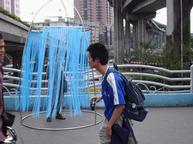 © Klaus Obermayer
© Klaus Obermayer
Empfangshalle (Lobby) researched the behavior of cell phone users. This artistic duo’s actions/performances staged to achieve specific effects and reactions visualize the new spaces and gestures engendered while cell phone users are on the line. There are many examples of how we create mobile “private spheres” for ourselves to communicate in public without disruption: there’s the caller who’s completely withdrawn inside himself, his eyes fixed to the ground as he makes his rounds on an uncharted path; and then there’s the one seated in the bus with his hand cupped over his mouth in a futile attempt to prevent others from overhearing an urgent discussion of his relationship problems.
Having come to the realization that “Whoever uses his cell phone in public disassociates himself from his surroundings via real or virtual spaces,” the artists formulated and constructed prototypes of “mobile telephoning spaces” that will be offered in conjunction with a worldwide telephone service.
Empfangshalle (DE)
12
Jul
Events, Concerts & Performances | posted by MariaHieslmayr | at 08:59:00
Maschine Mensch (Machine Man)
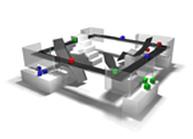 © Christopher Rhomberg / Tobias Zucali
© Christopher Rhomberg / Tobias Zucali
Direct control over a human being is turned over to a completely automatic system. This experimental set-up consists of an abstracted production line on which the component “human being” is deprived of control over his own body via electrical muscle stimulation and turned into an insignificant gear in the larger mechanism. When and how the human’s limbs are moved is determined by the computer. Thus, a person becomes a slave of a system that a person had originally designed—the perversion of the man-machine relationship.
The "Maschine Mensch" project received an Honorary Mention at Ars Electronica 2005 in [the next idea] grant competition.
Christopher Rhomberg (AT)
Tobias Zucali (AT)
Blog Autoren:
Maria Hieslmayr Cornelia Sulzbacher Wolfgang Bednarzek Gerda Hinterreiter Didi Offenhuber Beta Lounge Artists Sonja Meller StWSt denCity.net
Suche:
Kategorien:
Conferences Animation Festival Events, Concerts & Performances Campus Exhibitions e-lobby Prix Ars Electronica
Recent Posts:
Photographs of the 2006 Festival Media lab thanks! Ars Electronica Center FM4 Live from Ars Electronica in Linz
Archiv:
Posts 40 - 20 Posts 20 - 0


